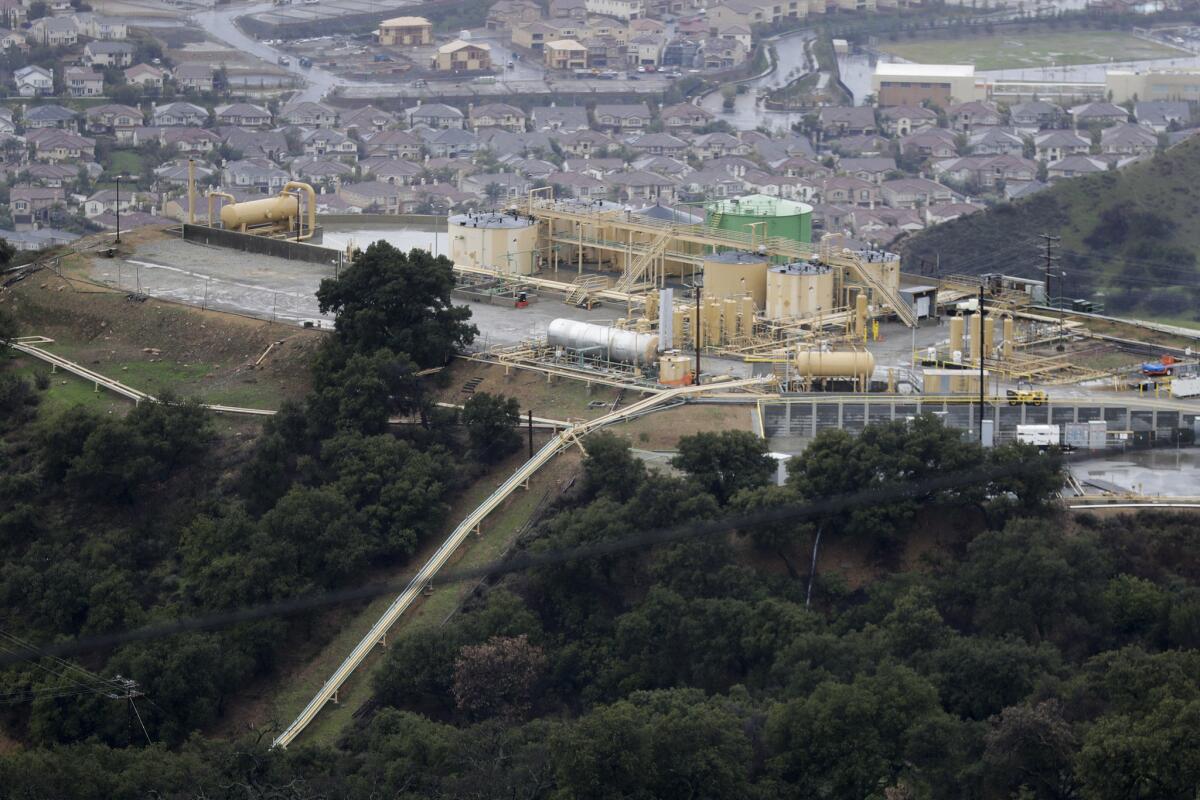L.A. County study decries state claims for need of Aliso Canyon storage plant

A scathing Los Angeles County study has concluded that the troubled Aliso Canyon natural gas facility isnât needed to ensure reliability of electricity and gas service in the region this summer or the coming winter.
That review sharply contrasts with the dire warnings issued last summer by state regulators, who stirred up fears of blackouts and the possibility of snuffed-out pilot lights come winter without the use of Aliso Canyon.
Some proponents of Aliso Canyon even took to social media, posting, âAre Southern Californians Afraid of the Dark?â to win support for keeping the storage facility in operation.
But according to the countyâs study, the facility may not even be needed. Whatâs more, the California Public Utilities Commission and the California Energy Commission have produced reports that âfail to provide the public with a complete picture of ⌠the need for withdrawals from Aliso Canyon.â
The information from California energy regulators on âpeak demand and the systemâs ability to supply that demand without Aliso Canyon are confusing and inconsistent,â stated the report by EES Consulting, a Kirkland, Wash., engineering firm hired by the county.
The Aliso Canyon natural gas storage plant is the largest in the state and the fourth largest in the nation. Understanding its role as a backup supply during a heatwave or cold snap is essential as regulators decide on the fate of the plant, which has been largely shuttered since an October 2015 methane link.
The leak lasted four months â the worst such incident in the nationâs history â and led the state to order a moratorium on injections of gas into the plant and limit withdrawals while a review of its operations were conducted. The utilities commission is set to hold hearings in the L.A. area April 17 to receive public input on Aliso Canyon.
Scott Kuhn, principal deputy county counsel for Los Angeles County, said EES Consulting was hired because of Southern California Gasâ repeated blackout warnings.
âWeâve been through a winter and weâve been through a summer and the sky is not falling,â Kuhn said. âThe report shows [Aliso Canyon] is not really needed,â he said, adding that further investigation is warranted.
The advocacy group Consumer Watchdog is also calling for an investigation. In a March 30 letter to state Atty. Gen. Xavier Becerra, the group said the report proves that regulators âcannot be trusted to honestly assessâ the need for Aliso Canyon.
For consumer advocate Bill Powers, a San Diego engineer who has lobbied for the facilityâs closure, the report offers some vindication.
âUltimately, the state really dropped the ball here,â Powers said.
The utilities commission said it would review the county study as well as all other public comments submitted in advance of its final report on Aliso Canyon.
âWhile the need for Aliso Canyon to meet demand in L.A. on high gas demand days has been reduced over the past year due to the success of mitigation measures and infrastructure upgrades to the electric transmission system, there is still a risk that there would be insufficient supplies of gas during a summer heat wave that could lead to curtailment of electric service,â said Terrie Prosper, a utilities commission spokeswoman.
Prosper said voluntary reductions in gas usage will be an important part of maintaining reliability during high electricity demand through the summer in the event Aliso Canyon remains unavailable.
Albert Lundeen, a spokesman for the California Energy Commission, did not address conclusions in the L.A. County report but said in a statement that the commission would continue working with the PUC, California Independent System Operator and the Los Angeles Department of Water and Power âto assure the energy system for Southern California remains reliable.â
Residents near the plant want it closed for good after the methane leak upended their lives. About 8,000 residents, largely in the nearby Porter Ranch community, had to flee their homes, many complaining of headaches, nosebleeds and nausea. The gas leak kept some out of their homes for months.
In addition, realtors said the gas leak disrupted the housing market as the problem spooked potential home buyers and left some sellers in a lurch. Some residents fear that if the plant returns to full operation, they remain at risk for another major leak.
âYou have a lot of people who are leaving,â said Andrew Krowne, who sits on the Porter Ranch Neighborhood Council. Krowne, an accountant whose office is in Porter Ranch, moved to Northridge after he, his wife and five children were displaced for five months in a hotel.
âItâs been proven again and again that this facility isnât needed,â Krowne said about the latest report from EES. âYouâve still got ongoing health issues. People donât know whatâs going on with their bodies.â
But that hasnât stopped Southern California Gas from pushing for the reopening of Aliso Canyon. The company says the plant is necessary to meet demand, pointing to withdrawals of gas on Jan. 24 and 25 when cold temperatures enveloped the region.
Without the plant, the company has been operating âa little bit on the edge,â said Chris Gilbride, a spokesman for Southern California Gas.
âLos Angeles County has not shared their study with us,â Gilbride said. âHowever, in three consecutive technical assessments the stateâs energy experts have concluded Aliso Canyon is necessary to support the reliability of the regionâs natural gas and electricity systems, and the results of those studies have been independently reviewed or verified by experts at the national labs.â
One review by Walker & Associates and the Los Alamos National Laboratory described Aliso Canyon as an âintegral part of the SoCalGas system, without which the system cannot function at maximal utilization or handle potential shortages of gas in the L.A. Basin and other areas.â
But it also pointed out that steps taken to offset the loss of Aliso Canyon may have helped prevent blackouts.
Those steps and other actions also eliminated the need to withdraw gas from Aliso Canyon in January, the county report said. At the time, Powers had argued that Southern California Gas was manipulating data to create an artificial need for fuel from Aliso Canyon.
âItâs embarrassing that the state, with so much attention on this, let SoCal Gas drive the bus and gin up a manufactured, artificial reason to withdraw a tiny amount of gas,â Powers said.
For more energy news, follow Ivan Penn on Twitter: @ivanlpenn
More to Read
Inside the business of entertainment
The Wide Shot brings you news, analysis and insights on everything from streaming wars to production â and what it all means for the future.
You may occasionally receive promotional content from the Los Angeles Times.











